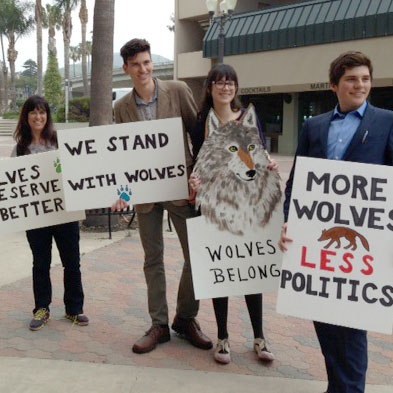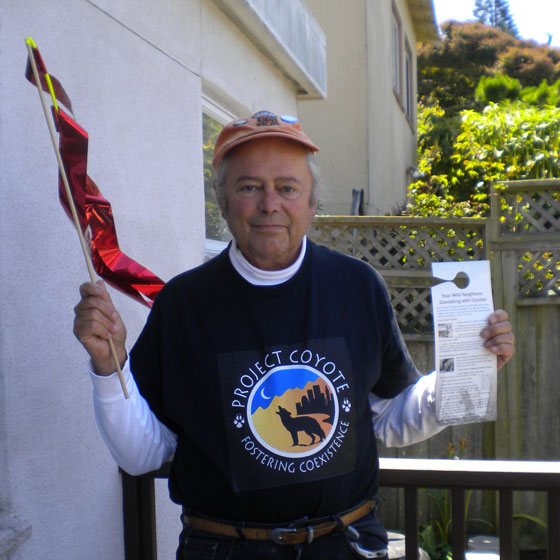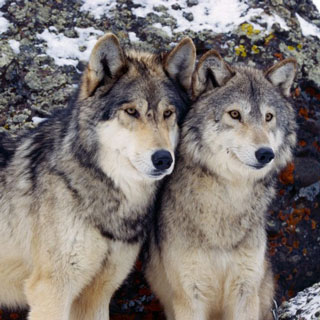- Young Voices Keeping It Wild
- Spotlight: Arizona Representative Linda Bolon
- Coyote Friendly Communities Welcomes Citizen Leaders
- Science and Stewardship: Challenging the U.S. Government’s Predator-Control Practices
- Hero for Wildlife Roger Hopping
- The Profanity of the Profanity Peak Wolf Pack Massacre
- Other News…
SEPTEMBER 2016
In this issue we are highlighting heroes and challenging mismanagement practices that continue to harm wildlife unnecessarily.
Today’s heroes include two inspiring young girls who each took a stand in their respective communities to protect coyotes. Two additional heroes featured are Project Coyote volunteers. They are Project Coyote’s Arizona Representative Linda Bolon, who describes her path to becoming a highly effective advocate for wildlife, and Project Coyote Community Leader Dan De Vries, who goes door-to-door sharing information that both addresses residents’ fears about coyotes and fosters coexistence.
Continuing our focus on heroes, we are excited to introduce a special category of hero, the Coyote Warrior. And we are especially pleased to announce that the recipient of Project Coyote’s first annual Coyote Warrior Award is Roger Hopping. As you’ll learn, Roger has shown singular courage on behalf of coyotes, including standing up for coyotes being slaughtered in killing contests. We are grateful to Roger for having brought killing contests in California to our attention back in 2013, and delighted to honor him with the Coyote Warrior Award and a written tribute, just published in Notes From the Field.
Heroes often arise in response to unethical or illegal actions. Here, two Project Coyote Science Advisory Board members take issue with the baseless slaughter of wildlife by government agencies in the service of political and special interests. First, George Wuerthner shares his opinion piece about the Washington Department of Fish and Wildlife’s ongoing extermination of the Profanity Peak wolf pack in northeast Washington. Next, we present highlights from a recently published research review by Adrian Treves and colleagues that show that lethal controls deployed by the USDA’s Wildlife Services program have been based on unsound science.
We honor these heroes’ efforts to protect wildlife through advocacy, education, activism and scientific inquiry. Whenever you question “What can I do?” let each of these heroes’ actions remind us all that one person can make a difference.
Never doubt that a small group of thoughtful, committed, citizens can change the world. Indeed, it is the only thing that ever has.
~ Margaret Mead
For the Wild,
Camilla H. Fox
Founder & Executive Director
Young Voices Keeping It Wild
Project Coyote’s “Keeping It Wild” program focuses on educating young people about predators and coexistence, and fostering respect and compassion for all wildlife. Often we find that it’s the young people who – inspire and educate us. Two recent examples include seven year-old Brooke Sahanaja from Porter Ranch, CA, and eleven year-old Emily Young, from Utah.
Last month Emily Young sent a Letter to the Editor of the Salt Lake Tribune, and met with Utah state representative Patrice Arent to deliver a binder including articles, research and information pertaining to the bounty on Coyotes in Utah. Emily had learned about the bounty program while attending a city-sponsored event where she met Kayla,a coyote pup taken in by the Wild Wonders Rescue program after her mother, had been shot by a hunter while pregnant with Kayla. That motivated Emily to write a letter to Governor Gary Herbert, and she spent the summer learning about how this program can legally exist.
Emily’s Letter to the Editor was published in the Salt Lake Tribune on August 17th, 2016, and now Emily wants to meet with other senators and representatives along with the governor. Go Emily!
And Project Coyote was honored this past August to receive a special visit from seven year-old Brooke Sahanaja and her mother, Sabrina. It seems that Brooke had become so concerned about coyotes disappearing from the area near their home outside of Los Angeles, that she took it upon herself to become a coyote advocate. In addition to learning about coyotes and the hardships they endure, and expressing her concern for them in a poster, Brook set out to raise money to donate to an organization that is committed to protecting coyotes. Sabrina said that Brooke and she decided that the organization they felt most deserved their support was Project Coyote. We could not be more grateful or impressed by their generosity, spirit and dedication.
Sabrina and Brooke arrived at the Project Coyote office to give Project Coyote Founder and Executive Director Camilla Fox a cashier’s check in the amount of $145.00. As you can see in this video of Brooke’s conversation with Camilla, her commitment to protecting coyotes is inspiring. You can read more about Brooke and Sabrina here, and see why there is hope that today’s parents and the next generation will be formidable allies for wildlife.
Spotlight: Arizona Representative Linda Bolon
Project Coyote’s Arizona Representative, Linda Bolon conducts community-wide educational outreach programs and provides coexistence brochures as well as hazing guidelines to residents. Helping communities respect and understand coyotes instead of misunderstanding and fearing them is part of the important message that Bolon communicates.
Linda first became concerned about coyotes after she retired in 2004 and moved from San Jose, California to a retirement community in Goodyear, Arizona. At the time, a representative from the Arizona Game and Fish Department was scheduled to speak to the community about “removing” coyotes. When Linda attended the meeting she learned there had been a number of small pets killed by coyotes, and that most seniors expressed fear of them. People were demanding the coyotes be rounded up and removed. The Arizona Game and Fish Department explained that “removed” meant killed. On hearing that, Linda decided she could not abide this policy, and subsequently committed herself to stopping what she viewed as slaughter.
Linda began a one-woman campaign to inform the community about what was happening. She found that no one she spoke with was aware of the Game and Fish Department’s kill policy. She urged residents who found the policy disturbing to write letters and speak up.
At that same time Linda discovered Project Coyote. She reached out to Project Coyote for information, and was soon armed with science-based research and educational resources. Unfortunately, seven coyotes in her community were killed before Linda could apply her newfound knowledge.
In response to the increasing public demand for information about wildlife in urban communities, Linda created the Wildlife in Neighborhoods program (WIN). The program aims to reduce conflict between people and their pets and wildlife by providing easily accessible, fact-based and useful information about coexisting with coyotes and other urban wildlife.
Over the past 12 years, Linda has given numerous educational presentations for her community at PebbleCreek and to their Pet Companions Club. Since Linda successfully instituted the WIN program in her community, only one small dog was killed by a coyote, for which the owners took responsibility.
Camilla Fox visited Linda’s community in Pebble Creek to show an educational video on coyotes. During that visit, Linda and Camilla met with members of the City of Goodyear, Arizona, the Arizona Game and Fish Department, and Animal Control in an effort to launch an official Coyote Awareness Program. And, while due to budget cuts that program never came to fruition, the collaboration led to Linda joining Project Coyote as the Arizona Representative.
As Linda says, “It is my goal to promote co-existence and educate residents throughout Arizona about the importance and ecological value of our coyotes. They are a symbol of the Southwest and our native people. Coyotes are the most misunderstood and persecuted mammals in the country. They should be valued and we should learn from their resilience, intelligence and adaptability.”
Learn more about Coyote Friendly Communities and explore Project Coyote’s downloadable brochures and resources.
Check out these Upcoming Arizona Events:
American Coyote Film Screening
October 5, 2016 @ 3pm
Host: PebbleCreek Pet Companions Club
Location: Eagle’s Nest Activities Center, Room 100
Robson Circle and Clubhouse Drive
Goodyear, AZ 85395
(Community Residents Only)
Coyotes in Our Midst Presentation
January 7, 2017 @ 11am
Host: White Tank Regional Park
Location: White Tank Branch Library – Waddell
20304 W White Tank Mountain Road
Waddell, AZ 85355
Project Coyote Booth at Outdoor Adventures
January 14, 2017 – 9am to 3pm
Host: White Tank Regional Park
Location: White Tank Regional Park
W White Tank Mountain Road
Waddell, AZ 85355
Coyote Friendly Communities: Meet Citizen Dan
Venture out into one of the many parks, hiking trails or neighborhoods in the Bay Area and you will likely encounter signs of one of Project Coyote’s most exciting and growing programs, called Coyote Friendly Communities™. For the past year, Project Coyote has worked closely with the City of San Francisco to create attractive, science-based informative materials to hang on front doors and post at trailheads and park entrances with tips and tools for coexisting peacefully with coyotes. These resources offer advice on how to handle coyote encounters as well as directions to access downloadable materials and information available on Project Coyote’s website. And, in one San Francisco community, the resources come hand-delivered by Dan De Vries, our personable and knowledgeable Coyote Friendly Communities Citizen Leader. Dan is clear in his mission: “I’m not only advocating for coyotes, I’m advocating for humanity.”
“I’m not only advocating for coyotes, I’m advocating for humanity.”
Dan became a Project Coyote Citizen Leader in the early spring of 2016, after meeting Project Coyote’s Founder and Executive Director Camilla Fox at a conference in San Francisco. He has since collaborated on a mapping tool that shows where he has distributed information and connected with people. He regularly submits reports of his outreach to Project Coyote and San Francisco’s Animal Care and Control (AC&C). He has been quietly pioneering a practice that many citizens who care about wildlife may be interested in emulating. With that in mind, we recently caught up with Dan to learn more about his background and experiences educating members of his community about coyotes and other wildlife.
“I went out on coyote walkabout again today….I talked to a woman who wasn’t so much hostile as fearful. She said she wasn’t going out in the dark any more. I showed her the little red AC&C flasher and she asked “how much?” I explained that I was giving them away and she asked for another for her husband.” – Report Excerpt by Dan De Vries
If you find yourself inspired to become a Citizen Leader in your community, we encourage you to visit Project Coyote’s website, get involved, check out our downloadable resources, and learn more about the purpose and impact of our Community Friendly Communities program.
Science and Stewardship: Challenging the U.S. Government’s Predator-Control Practices
In the September, 2016 issue of Frontiers in Ecology and the Environment, a journal published by the Ecological Society of America, Project Coyote Science Advisory Board member Adrian Treves and colleagues Miha Krofel and Jeannine McManus published a review exposing the weak science that has bolstered the U.S government’s predator control practices.
In their peer-reviewed article “Predator Control Should Not be a Shot in the Dark,” this trio of environmental scientists calls for a moratorium on lethal predator control policies until researchers adopt higher testing standards. The new findings are hailed by wildlife conservation groups like Project Coyote which have questioned traditional predator management policies and practices such as those carried out by the U.S. Department of Agriculture’s Wildlife Services program.
With little rigorous, scientific testing available, farmers and ranchers have historically relied upon taxpayer subsidized lethal predator control programs to protect their livestock. The authors’ research findings show that the scientific studies that proliferated since the 1970s have disproportionately supported lethal methods of predator management.
In an effort to systematically evaluate the totality of the scientific research on lethal versus non-lethal predator management, the reviewers of the September study screened all of the relevant research – 500 discrete projects in all. Of those, only two experiments met the gold standard for reliability, as defined by the authors of the review.
“We expect backlash from those agencies and individuals who benefit from the status quo,” said Adrian Treves, the lead co-author of the paper. “Independent scientists serve the broad public interest when they scrutinize the science used to promote government policies.”
The authors point out that it is the research they rejected for non-random assignment, poor methods and other design flaws that has been used by government agencies to make lethal management policy. In 2014, the U.S. Department of Agriculture’s Wildlife Services (USDA WS) program exterminated 796 bobcats, 322 wolves, 580 black bears, 305 cougars, 1,186 red foxes, and 61,702 coyotes. Wildlife Services reports that across the United States, it spent about $127 million in fiscal year 2014 to kill 2.7 million animals, including 322 wolves. For decades, wildlife conservationists and scientists have condemned the indiscriminate and lethal approach to predator management as carried out by state wildlife agencies and the USDA. However, the agencies have justified their actions by claiming that science supports the killing of hundreds of thousands of predators each year, largely at the behest of ranchers and agribusiness.
“This review shows that state and federal agencies are relying on bad science and bad research to justify their use of lethal predator control programs,” said Camilla Fox, Founder and Executive Director of Project Coyote. “We have just received another piece of evidence that killing predators is unjustified ethically, economically and certainly ecologically.”
To learn more, you can read the journal article, and this Public News Service report, as well as National Geographic’s coverage of the study, and a video about the article’s findings. You can also read an earlier study co-authored by Adrian Treves and Guillaume Chapron, refuting the science behind culling practices.
The Profanity of the Profanity Peak Wolf Pack Massacre
You’ve probably seen the news and op-eds about the Washington Department of Fish and Wildlife’s (WDFW) tragic and avoidable slaughter of the Profanity Peak wolf pack in northeast Washington. The WDFW began killing the wolves in early August, after receiving reports from a rancher that his cattle had been attacked. As of today six of the 11 wolf pack members have been exterminated, including 4-month old pups. The agency is searching for, and intending to kill, the rest.
In this Notes From the Field post, Project Coyote Science Advisory Board member George Wuerthner voices what so many of us feel: that killing an entire pack of endangered wolves to serve ranching interests is not only inhumane and unnecessary, it is ineffective, and a breach of the public trust.
That this tax-funded slaughter has been occurring on public lands is emblematic of the chronic mismanagement of wolves, other predators, and wildlife in general. It is scientifically unsupported and politically driven. Our government should be stewards of wildlife, making decisions based on sound science and the public good. Government should not act as assassins working on behalf of special interests.
As George says, “What is particularly egregious about the ongoing slaughter of the Profanity Pack is that it was essentially a preventable conflict. Had the rancher, whose cows invaded the wolf pack’s territory, been required to use other public lands, or better yet, simply lease private pasture, there would have been no livestock losses, hence wolf deaths.”
Read the post by George Wuerthner and learn about Project Coyote’s work in reforming predator management and educating people about wolf ecology and the threats wolves face.
The First Annual Coyote Warrior Award
Project Coyote is excited to launch its first annual Coyote Warrior Award this year honoring Roger Hopping. The award celebrates the courage and commitment of everyday heroes who go above and beyond for the benefit of wildlife.
As you can read in Camilla Fox’s recent Notes From the Field post, Project Coyote first learned of Roger’s efforts to help coyotes in January, 2013 when he was desperately seeking assistance to stop coyote killing contests scheduled to take place in his hometown of Adin, California in Modoc County.
Roger emailed background information about the event and a promo poster featuring a bloodied coyote skull. Immediately, Camilla and Roger began assembling a coalition of organizations that would join forces to stop Modoc County’s “Coyote Drive” from taking place on public lands.
To get the whole story about Roger and his fight to stop killing contests, visit Notes From the Field. You can learn more about this subject by exploring Project Coyote’s library of videos and information dedicated to stopping wildlife killing contests that occur across the country.
OTHER NEWS
Project Coyote Science Advisory Board member Marc Bekoff interviews Dan Flores, author of “Coyote America: The Evolution of Human-Animal Relationships”.
Take action to stop the slaughter of the Profanity Peak pack.
Read news coverage about the study by Adrian Treves and colleagues showing that non-lethal methods of livestock protection are more successful than culling. And learn more about the lethal practices waged by wildlife services.
Join our E-TEAM
Get periodic e-news, action alerts, and join our growing network of educators, scientists, predator friendly ranchers and citizen leaders who are helping people and wildlife coexist in our communities.
Join a growing community of educated and empowered citizens by expressing your commitment to compassionate conservation with a financial investment.
You can DONATE, become a SPONSOR or leave a LEGACY GIFT.










